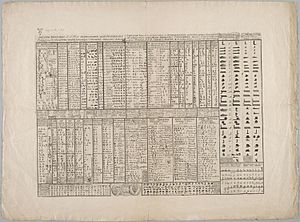Edward Bernard facts for kids
Edward Bernard (born 1638 – died January 12, 1697) was an English scholar. He was a professor of astronomy at the University of Oxford from 1673 to 1691. This special role was called the Savilian Professor of Astronomy.
Life Story
Edward Bernard was born in a place called Paulerspury in Northamptonshire, England. He went to school at Merchant Taylors' School. Later, he studied at St John's College, Oxford. He became a scholar there in 1655 and a Fellow (a senior member) in 1658. He earned his Master of Arts degree in 1662.
In 1669, Edward Bernard started teaching astronomy. He was helping Christopher Wren, who was the Savilian Professor at the time. Wren was a very busy person, also working as the King's chief architect. Because Wren was so busy, he eventually left his teaching job.
In 1673, Edward Bernard took over as the Savilian Professor of Astronomy. He also became a member of the Fellow of the Royal Society, which is a group of important scientists. That same year, he became a chaplain (a religious advisor) to Peter Mews. In 1676, he traveled to Paris to teach two young noblemen, Henry FitzRoy, 1st Duke of Grafton and George FitzRoy, 1st Duke of Northumberland. From the 1670s, he made many good friends and connections with scholars across Europe. He wrote letters to people like Hiob Ludolf and met others in Oxford. He also visited Pierre-Daniel Huet and wrote to Jean Mabillon.
He watched the comet of 1680 and discussed it with another astronomer, John Flamsteed. In 1691, he became the rector (a type of priest) of a church in Brightwell, Oxfordshire.
His friend, Thomas Smith, wrote a book about Edward Bernard's life.
Edward Bernard passed away in Oxford on January 12, 1697. He was buried four days later in the chapel at St John's College.
His Work and Books
Edward Bernard spent a lot of time studying old handwritten books, called manuscripts. He was especially interested in the writings of Apollonius of Perga, a famous ancient Greek mathematician. In 1669, he traveled to Leiden in the Netherlands to look at collections of manuscripts. He also worked on old Arabic texts at the Bodleian Library in Oxford. More than twenty years later, he went back to the Netherlands to buy more old books for another scholar, Narcissus Marsh.
At the same time, in the 1680s, he started to prepare the works of Josephus for publication. Josephus was a very important Jewish historian from ancient times. Edward Bernard's work on geometry was never fully finished. His Josephus edition had many notes but was also not completed. His detailed notes and translations were later used by Edmund Halley for his own translation of Apollonius.
Many of Edward Bernard's scholarly notes were written inside the books in his own library. After he died, the Bodleian Library bought these books, bringing his notes back to the library.
One of his important books was De mensuris et ponderibus antiquis (1688). This book was about ancient weights and measures. It first appeared as a small part of another book, then was published on its own with more information. He also helped to create an edition of a work by Aristeas. His book Orbis Eruditi was a table showing many different alphabets from around the world.
His most famous work was Catalogi librorum manuscriptorum Angliæ et Hiberniæ in unum collecti (Oxford, 1697). People often called it "Bernard's Catalogue." This book was a huge list of all the handwritten books found in libraries across Britain and Ireland. It became a very important tool for scholars who wanted to find and study old texts. Humfrey Wanley helped him put this big list together.
Some people used to say that a tenth-century Egyptian astronomer named Ibn Yunis used a pendulum to measure time, even before Galileo. However, recent studies show that Edward Bernard's claim about this is not true.
 | Stephanie Wilson |
 | Charles Bolden |
 | Ronald McNair |
 | Frederick D. Gregory |


